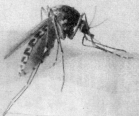
ROSS RIVER VIRUS
Research
Research - What is being done about Ross River Virus?
The Queensland Institute of Medical Research (QIMR) has a team working on activities related to Ross River Virus. Their work is mostly aimed at mosquito control aand understanding the changes that occur when human cells are infectd by RRV in order to develop more effective diagnostic tests and treatments.
Queensland University of Technology (QUT) have developed a vacine but cannot progress it for use in Australia due to lack of support by health authorities and funds. QIMR and QUT teams work closely together.
Australian National University (ANU) is looking at mosquito-borne viruses. In particular the molecular bases of the diseases caused by these viruses.
Other institutions implementing research or monitoring the mosquito-born viruses include:
CSIRO, University of Western Australia, University of Queensland, University of New South Wales.
Research is also being carried out in South Australia and New South Wales.
Health Departments of States and Territories are monitoring the disease.
Studies in Western Australia and South Australia have shown that long-term disability is more common than most Doctors believe. They studied people at 15 months and 30 months after infection.
A NSW study is currently implementing a 3 year study.
Research - What is not being done?
There is no research being carried out on long-term suffers particularly those who have had it more than 3 years. So there is no official knowledge of the long-term affects of the disease.
Research - What could be done.
Ross River Virus is a notifiable disease therefore, it could be very simple to contact a majority of the people, who have been diagnosed and Health Department notified, to find out if they still have symptoms.
You are the visitor to this page
Copyright © 1998 rrvepa All rights reserved..
This page hosted by ![]() Get your own Free
Homepage
Get your own Free
Homepage